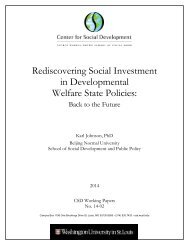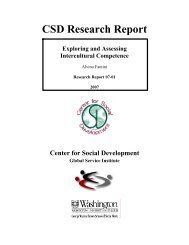Perceived Effects of International Volunteering - Center for Social ...
Perceived Effects of International Volunteering - Center for Social ...
Perceived Effects of International Volunteering - Center for Social ...
Create successful ePaper yourself
Turn your PDF publications into a flip-book with our unique Google optimized e-Paper software.
Network-Related Resources<br />
<strong>International</strong> Networks<br />
As volunteers interact with community members in host countries, they build relationships that may<br />
continue when volunteers return home. It is anticipated that volunteers who stay in the host country<br />
<strong>for</strong> extended periods <strong>of</strong> time may build more enduring relationships. These data suggest that this<br />
may be the case. WorldTeach alumni were more likely than CCS volunteers to report having<br />
international networks and to correspond frequently with these connections (See Figure 4). 26<br />
Although it is not known whether these networks predated their international volunteer experience,<br />
qualitative comments suggest that volunteers develop many connections during their placement.<br />
Average Agreement<br />
Figure 4: <strong>International</strong> Network Resources Reported by Alumni<br />
(N = 269) i<br />
6<br />
5<br />
4<br />
3<br />
2<br />
1<br />
0<br />
Have int'l<br />
contacts<br />
Frequently<br />
corresponded<br />
with int'l<br />
contacts<br />
Gave<br />
resources to<br />
int'l contacts<br />
Connected<br />
with an int'l<br />
organization<br />
i Duration <strong>of</strong> placement varies: CCS = 6.1 weeks, WorldTeach = 43.1 weeks<br />
Used int'l<br />
contacts to<br />
advocate<br />
Across both organizations, a majority (65 percent) <strong>of</strong> alumni report corresponding with contacts in<br />
other countries through email, followed by regular postal mail (32 percent) and telephone (30<br />
percent). Volunteers also reported corresponding with their host community connections on social<br />
network sites such as Facebook or MySpace. Twenty percent <strong>of</strong> the alumni revisited someone in the<br />
community, and eight percent had someone from the host community visit them.<br />
While social networks are <strong>of</strong>ten mutually beneficial, one significant advantage <strong>of</strong> these relationships<br />
<strong>for</strong> host organizations and communities are the resources that these connections may provide. 27<br />
Perhaps due to their longer engagement with host communities, WorldTeach alumni were more<br />
26<br />
Significance testing utilizes a composite variable composed <strong>of</strong> six items measuring social networks, t = 3.38, df = 268,<br />
p < .001, x1 = 4.7, x2 = 4.1, sd1 = 1.4, sd2 = 1.4<br />
27 Mayer, 2003; Randel et al., 2004; Wilson & Musick, 1998; Woolcock, 1998<br />
C ENTER FOR S OCIAL D EVELOPMENT<br />
W ASHINGTON U NIVERSITY IN S T . L OUIS<br />
WorldTeach<br />
CCS<br />
Used int'l<br />
contacts to<br />
link others to<br />
resources<br />
24
















